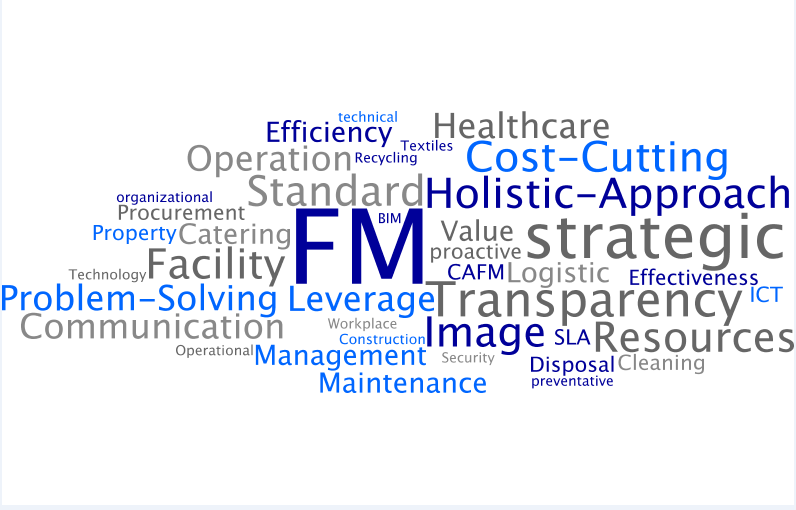Prof. Dr. Susanne Hofer, Zurich University of Applied Sciences, Institute of Facility Management, asks why the non-medical processes are well worth a closer look.
Facility Management – a broad concept
According to the European Committee for Standardisation Facility Management (FM) is defined as, ‘the integration of processes within an organisation to maintain and develop the agreed services which support and improve the effectiveness of its primary activities’. Simply put, FM supports the core business of any organisation and therefore the nature of FM is very broad and compliant. This is how the Institute of Facility Management at Zurich University of Applied Sciences looks at the concept of FM. Within the healthcare context, FM refers to the variety of non-medical support services and their corresponding processes in hospitals and other healthcare institutions, such as nursing homes.
For the past ten years, one of the institute’s research main focus has been on FM in healthcare, mainly on the Swiss situation. From that experience it can be stated that even though FM is emerging as a recognised management discipline, there is still much potential to align and improve the effective coordination of services through proper management of the buildings, spaces, people and infrastructure available to an organisation, in order to reveal financial savings as FM amounts for around one-third of healthcare institutions total costs.
An aspect that was hindering this process is that FM has not been seen as holistically as it should due to lacking definitions. To tackle this issue, the institute recently developed a catalogue of the non-medical support services that healthcare institutions require in order to run efficiently, available in German, French and English. This document clarifies what FM in the healthcare industry includes and also takes into account that the practices of individual organisations vary.
Current challenges require evidence-based data
National healthcare services are increasingly forced to operate with fewer resources and under greater pressure than they have done in the past. Switzerland, for example, drives one of the world’s most expensive national health services and due to difficult economic times and the demographic change, cost reductions are mandatory. Thereby FM is commonly seen as the preferred area to cut costs. In order to argue for and against such measures, facility managers need to be equipped with evidence-based data to advocate for their tasks and services. This includes cost-transparency within the FM area, agreed on service-levels and sets of different options for actions respectively clear indications what cost cuts mean in terms of service levels or opposite elaborated argumentation for the leverage effects investments in FM can have on customer satisfaction and the organisations overall image. So far this is still a field with a lot of research potential. For example, the needed cost transparency is by far not yet achieved, at the time being accounting structures are revealed and put in place to enable this crucial demand within and also across healthcare institutions.
Based on afore issues, it is that FM’s value is not yet thoroughly recognised and accepted at the strategic level of an organisation. The constant advocacy of the efforts done by institute members is paying off as healthcare institutions increasingly place Chief Facility Manager Officer (CFMO) in their executive boards.
This aligned advocacy for the benefit of FM in healthcare would not be possible without the close relationship between researchers and practitioners the institute has developed over time. Evidence-based data and applicable tools are developed with and for practitioners, according to the purpose of a university of applied sciences. To focus on applied research and development, as well as, on consultancy in FM in healthcare the developed and existing trusting relationship the institute shares with the industry is essential.
Importance of international perspectives
Even though the institute focuses on healthcare institutions within the Swiss context, applied research and development cannot be done without looking beyond ones own borders. FM in healthcare happens everywhere, aligned with cultural customs and available resources. Keeping up with ongoing process developments is crucial as innovation does not only happen in Switzerland. Picking up alternative or improved processes to deliver effective and efficient FM in healthcare and to align them to Swiss requirements is one of the key deliverables the institute offers to practise.
Passion for FM in Healthcare
The passion for FM in healthcare emerges from the diversity of the field, especially requiring the skill to communicate and work with FM in healthcare stakeholders across organisational and hierarchical levels as well as different disciplines. This high complexity makes the research area highly fascinating. And as an educational institution the applied R&D activities are constantly into the curriculum to equip students to take part in decisive strategic discussions, as well as giving them a broad understanding of tactical and operational FM knowledge. That pays off as more and more former students are placed in strategic FM positions within healthcare institutions, continuingly advocating for FM’s potential.
Prof. Dr. Susanne Hofer
Senior researcher and lecturer, member of the institute management board
Zurich University of Applied Sciences, Institute of Facility Management
+41 58 934 56 28
https://www.zhaw.ch/en/lsfm/institutes-centres/ifm-institute-of-facility-management
Service Catalogue for Non-medical Support Services in Hospitals: http://pd.zhaw.ch/publikation/upload/208537.pdf
Please note: this is a commercial profile











